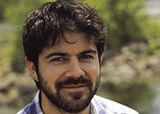Swarthmore Professor Gives Lecture on Truthfulness and Civility

Jonny Thakkar
The concept of “political correctness” and whether or not it interferes with authentic social discourse was one of the topics discussed in depth at “Truthfulness and Civility,” a lecture given by Professor Jonny Thakkar. Students and political science and philosophy faculty attended the event that was sponsored by the Center for Freedom and Western Civilization and the Forum on Philosophy and Religion, on Friday, Feb. 21 in Persson Auditorium.
Thakkar is a published author and teaches political philosophy at Swarthmore College where he is also a member of the faculty of the Department of Political Science. This year, the courses he teaches include Ancient Political Thought, Capitalism and Socialism, Modern Political Thought and Ethics and Economics.
“My goal is to get students to think in new ways about the political and economic structures around them while teaching the skill of rigorous argument,” Thakkar said.
Professor of Political Science and Director of the Center for Freedom and Western Civilization Robert Kraynak met Thakkar at an Ancient Philosophy conference at Wesleyan University and invited Thakkar to speak at Colgate.
“[This association on campus] sponsors research and public discussion of classical texts and contemporary issues in light of ancient wisdom,” Kraynak said.
Associate Professor of Philosophy Jacob Klein and George Carleton Jr. Professor of Philosophy David Dudrick asked Thakkar to give a lecture at Persson Auditorium to discuss the article “Chronicle of Higher Education,” in which Thakkar writes about Plato and political correctness.
“The main goal of the lecture is to expand on the arguments I’ve made in two recent essays, one called ‘On Being An Arsehole’ and the other called ‘Putting the Political Back Into Political Correctness,’ where I have tried to think through controversies concerning our intellectual climate by going back to Socrates and Plato,” Thakkar said.
In his lecture, Thakkar contemplated the subjective nature of truth, quoting figures like Plato and Friedrich Nietzsche. He tackled existential topics such as when it is acceptable to lie.
“There is an inescapable tension between our ideals of truthfulness (accuracy, sincerity and authenticity) and our duties to be civil towards one another as citizens, and that the psychic pressures of living with this tension are increasingly hard to bear,” Thakkar said.
“[The lecture] examined contemporary conflicts between pursuing and speaking truth that might be offensive or disruptive and the need for social consensus and civility. Using both personal insights and Socratic philosophy, he explained how there is a tension between these two goals that can be managed but never be completely resolved,” Kraynak said. “He made us aware that our contemporary problems are part of the human condition which philosophy can illuminate but not overcome in any permanent fashion.”
Sophomore Fiona Saunders is a political science concentration and philosophy minor and heard about this lecture through Professor Klein.
“It’s an interesting bridge between philosophical topics and also political science,” Saunders said. “I think the contradiction between civility and truthfulness is a really interesting issue and I thought the examples he gave were very helpful and entertaining at times. I really liked that he approached the talk as simply sharing his thoughts and wanting to also hear our opinions instead of just giving a lecture and speaking from a complete position of authority. I look forward to reading his future work on this material.”






